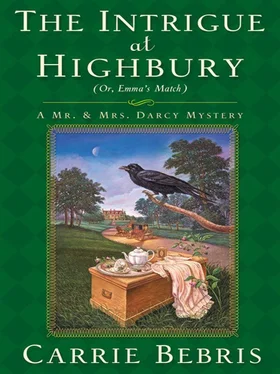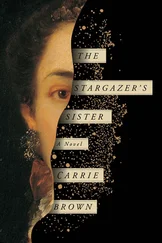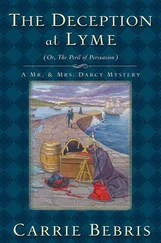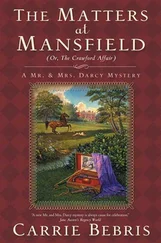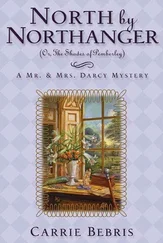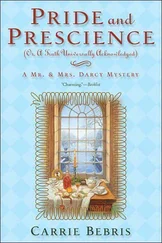“We can stop at the apothecary shop to see him on our way to speak with Miss Jones,” Elizabeth said.
“He is not there,” Mrs. Knightley replied. “He has gone back to Randalls to check on his patient. However, he promised to stop here again with a report. I will convey your recommendation about warning the villagers.”
“We also need to talk to Thomas Dixon. Is he here?”
“No, he is gone to London to see about Miss Bates’s new furniture.”
Was nobody in Highbury today? “When he returns, try to keep him here until we have an opportunity to question him. It seems he knows more about Edgar Churchill’s final hours than he has admitted.”
As Darcy and Elizabeth waited for their cloaks, Mrs. Knightley suddenly recalled another matter for Darcy’s attention. “In all the business about Nellie, I nearly forgot — a letter arrived for you. Actually, it was addressed to both you and Mr. Knightley.” She went to retrieve it and returned directly.
Darcy knew the hand at once.
Gentlemen,
I am delighted to be of service in your investigation, particularly in regards to this most intriguing clue. I assure you of my discretion, as well as that of the young philologist to whom I referred your query. Mr. Atwell has a keen interest in lexicography; indeed, I believe he means to be the next Samuel Johnson. I enclose herewith his reply. You will see that although he offers several possible meanings for “unkind individual,” he decidedly favors one. Mr. Atwell believes the writer’s employment of the collective noun for crows to denote “murder” suggests the use of the same strategy in the earlier portion of the message. For my part, although I find it fascinating to learn that a group of ravens is called an “unkindness”—an altogether fitting term for the gloomy creatures — I fail to see how that information can possibly aid your quest. Shall I present the message to another connoisseur of language? I know a professor at Oxford who might be consulted. Consider me at your disposal. I am—
Yours sincerely,
Chatfield
It was the very event to engage those who talk most, the young and the low; and all the youth and the servants in the place were soon in the happiness of frightful news.
—
Emma
“Perhaps a raven witnessed the murder of Churchill.”
The fully revealed message sent a shiver through Elizabeth as she spoke it aloud. “If the riddle is true, the raven did not merely portend Edgar Churchill’s death — the poisoning occurred at the camp.”
“I do not understand,” said Mrs. Knightley. “Do you speak of the bird that appeared during your robbery?”
“Yes, or one kept by the same individuals — Rawnie Zsófia said that the gypsies train them,” Elizabeth replied. “Regardless, Edgar Churchill and Thomas Dixon visited the gypsy camp several hours before your party, and while they were there, a raven took particular notice of Mr. Churchill.”
“Madam Zsófia must have found an opportunity to administer the poison to Edgar Churchill while he was there,” Darcy said. “Perhaps through one of her physics.”
“But Miss Jones said that while the gypsies camped outside of Highbury, no English came to Rawnie Zsófia for healing.”
“Since when have we considered Miss Jones a trustworthy source of information? Moreover, I believe she said that none had come to the camp for that purpose — which does not mean that no one came for a different purpose, and received treatment while there.”
The servant appeared with their cloaks. As Elizabeth donned hers, she pondered a point that had been troubling her. “We have neglected to consider the second poisoning — Frank’s, which occurred several days after the gypsies quit Highbury. Perhaps the poison was not given directly while Edgar Churchill was at the camp, but sent home with him and taken afterwards.”
“Self-administered?” Darcy asked.
“Or administered by Thomas Dixon.”
“I cannot believe that of him,” said Mrs. Knightley. “If Mr. Dixon is guilty of any crime, it is idleness. Or perhaps too great an attention to fashion.”
“Well, someone is guilty of murder,” Darcy said. “And someone else knows more than he or she has said, because the raven did not write that riddle. It is now even more critical that we talk to Miss Jones and Thomas Dixon about what occurred at the gypsy camp. Perhaps with three versions of events, we can begin to piece together what actually happened.”
The Darcys were very nearly deterred from interviewing Miss Jones by the sight of Miss Bates approaching Mrs. Todd’s house at the same time as they.
Darcy emitted a low groan. “If that lady takes hold of the conversation, we shall never get it back.”
Elizabeth feared the same thing. She had come to believe that Miss Bates could talk for an hour without pausing for breath. They did not have an hour to waste.
“I shall take care of Miss Bates.”
She deemed it best to seize the initiative. “Good afternoon to you, Miss Bates! How delightful to meet you again. Is your business with Mrs. Todd, I hope? For we were hoping for a private consultation with Miss Jones.”
“Oh! Mr. and Mrs. Darcy! You are returned from Guildford! I was—” She glanced at the door on which she had been about to knock, then back at them apologetically. “I came to see Miss Jones myself. I thought perhaps she could tell me about Mr. Deal — whether the terrible things I hear are true. Why, people are saying he poisoned poor Nellie, and probably Frank and Mr. Churchill. Oh, Mrs. Darcy! He cannot have poisoned Frank — or anybody — can he? I will not believe it of him. Not our Mr. Deal! I thought perhaps Miss Jones could read it in the tea leaves, or something. — It is nonsense, I know — fortune-telling — but I simply have not been able to stop thinking about it all. I found a note from Mr. Deal today. — Nothing improper, mind you. — Gracious, it is years since a note to me from any man might excite speculation! — He must have left it before all the unpleasantness.”
“May I ask what it said?” Darcy enquired.
“Oh, he thanked me and Mother for the tea we shared on Sunday. It should more properly have been addressed to my mother, or to us both, I suppose, but it was thoughtful nonetheless. He is all consideration, Mr. Deal — though he forgets it was Wednesday we had the tea, not Sunday. Men do not have the memory for such details that we women do — is that not true, Mrs. Darcy? Pray, forgive my saying so, sir. I only mean it in good nature. But you have seen Mr. Deal, yes? How does he get on?”
“As well as can be expected,” Elizabeth said, “and he thanks you for the basket.”
“Oh!” A smile spread across her face. “I am so glad! I—”
“In fact,” Elizabeth continued, “if you care to send anything else by Mr. Darcy tomorrow, he would be happy to accept the commission.”
Miss Bates looked to Mr. Darcy. “Would you? Oh! Perhaps I should — why, yes — I shall gather some more things together right now, and you can bring them whenever you next go there. Will you be long with Miss Jones?”
“We have several errands this afternoon,” Elizabeth said. “I will call for the parcel in the morning.”
Miss Bates departed in happy occupation — leaving them in happy solitude. Darcy looked at Elizabeth with admiration.
“That was well done.”
Their luck held: Miss Jones was at home. Mrs. Todd invited the Darcys to wait in the small sitting room, then sent her daughter to summon Loretta. Alice returned a minute later to report that Miss Jones would be down to receive them directly. The child then hung about, staring at their visitors to the point where Mrs. Todd gave her a coin and dispatched her to the post office to see whether any letters had arrived from her brothers.
Читать дальше
